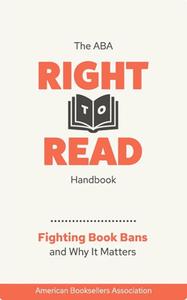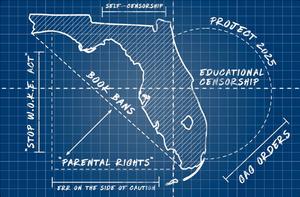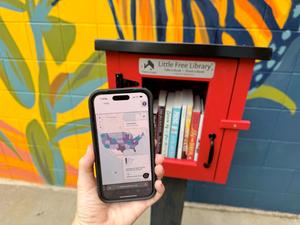 Published a year ago, The ABA Right to Read Handbook: Fighting Book Bans and Why It Matters, is designed for book readers, "the potential advocate who may only have a few hours to spare each month. It identifies the causes, actors, motivations, and strategies of groups attempting to ban books across the country. It offers step-by-step guides for voting in a school board election, understanding a school board's policies, contacting elected officials, and more. It features interviews with free expression advocates and state-by-state profiles of local advocacy organizations. Finally, the content is organized into a playbook that will allow concerned readers to begin defending the right to read as soon as book bans arrive in their community."
Published a year ago, The ABA Right to Read Handbook: Fighting Book Bans and Why It Matters, is designed for book readers, "the potential advocate who may only have a few hours to spare each month. It identifies the causes, actors, motivations, and strategies of groups attempting to ban books across the country. It offers step-by-step guides for voting in a school board election, understanding a school board's policies, contacting elected officials, and more. It features interviews with free expression advocates and state-by-state profiles of local advocacy organizations. Finally, the content is organized into a playbook that will allow concerned readers to begin defending the right to read as soon as book bans arrive in their community."
---
Book publishers and book organizations, including the ABA, the AAP, PEN America, and others, have filed lawsuits and friend-of-the-court briefs against book bannings. Penguin Random House has a handy summary of the key lawsuits challenging state laws, school boards, school administrators, and others in Florida, Texas, Idaho, Iowa, Arkansas, California.
At the same time, Freedom to Read legislation has been introduced in 25 states this year and passed in seven, providing crucial protections for libraries, educators, booksellers, and readers.
---
 PEN America's "Blueprint State" report from June outlines how book banning efforts in Florida, which "has led the country in advancing the 'parental rights' agenda," is being used as a template for public education policy under the Trump administration and in other states. The Florida laws "deliver control over what students can read and learn in schools not into the hands of all parents but to a particular segment of citizens," and have resulted over the past four years in "banning books about penguins and Michelangelo's David, purging school and classroom libraries, canceling field trips and theatrical productions, censoring student clubs, and revising and removing certain textbooks."
PEN America's "Blueprint State" report from June outlines how book banning efforts in Florida, which "has led the country in advancing the 'parental rights' agenda," is being used as a template for public education policy under the Trump administration and in other states. The Florida laws "deliver control over what students can read and learn in schools not into the hands of all parents but to a particular segment of citizens," and have resulted over the past four years in "banning books about penguins and Michelangelo's David, purging school and classroom libraries, canceling field trips and theatrical productions, censoring student clubs, and revising and removing certain textbooks."
---
The National Coalition Against Censorship offers a School Book Challenge Resource Center.
---
PEN America's "Cover to Cover" report from February analyzed the titles banned in the 2023-2024 school year. Among its findings: there were more than 10,000 instances of banned books in public schools, affecting more than 4,000 different titles. These mass book bans were often the result of targeted campaigns to remove books with characters of color, LGBTQ+ identities, and sexual content from public school classrooms and libraries. Fully 36% of all banned titles featured characters or people of color and 25% included LGBTQ+ people or characters; 73% of all graphic and illustrated titles feature LGBTQ+ representation, people or characters of color, or discuss race or racism; and in contrast to the hysteria about "sexually explicit" books, only 13% of banned titles had "on the page" descriptions of sexual experiences.
---
 The Little Free Library has updated its interactive Book Ban Map, developed in partnership with the ALA's Office for Intellectual Freedom and PEN America. The map now shows the latest data, highlighting where book bans are intensifying, and showing nearby Little Free Library locations, "where readers can freely access books."
The Little Free Library has updated its interactive Book Ban Map, developed in partnership with the ALA's Office for Intellectual Freedom and PEN America. The map now shows the latest data, highlighting where book bans are intensifying, and showing nearby Little Free Library locations, "where readers can freely access books."
Daniel Gumnit, CEO of the Little Free Library, said, "At the Little Free Library nonprofit organization, we believe that access to books is a fundamental right and a cornerstone of an informed, engaged society. This newly updated map empowers communities to protect intellectual freedom, champion diverse voices, and ensure that the joy of reading remains accessible to all."

